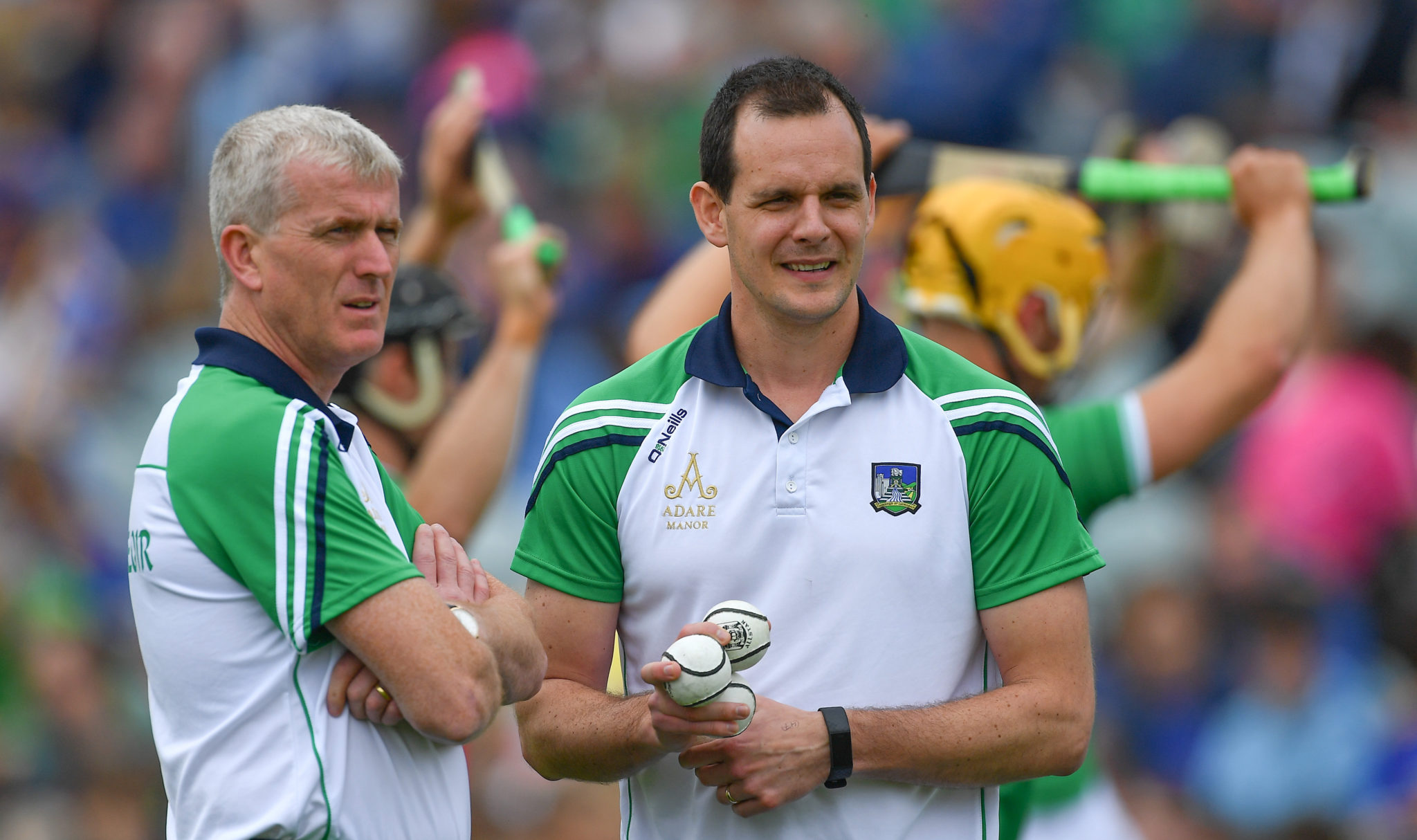Of uncertain footing in discussions regarding hurling and classical music, OTB Sports' Arthur James O'Dea sought out two experts to explain how one can assist in understanding the other.
*****
If you imagine hearing this music for the first time, not being able to tell or even really guess what’s going to happen next, it is similar to watching a game where something planned or expected suddenly goes wrong.
- Professor Laura Tunbridge, Oxford University
You want to sum Limerick up? Multifaceted. There’s a short way of summing up that there is no short way of summing them up.
- Jamie Wall, hurling analyst
*****
This current period of Limerick hurling has defied the expectations of a county more familiar with unrealised potential. As the title of Henry Martin’s Unlimited Heartbreak attests, theirs is story made up mostly of sporting tragedies.
“We’ve been here a number of times in the last 30 or 40 years,” Shane Dowling warned in the aftermath of Limerick’s All-Ireland semi-final defeat of Cork in 2018, “and this time I really hope we’re not just going to get to the final to march behind the band. I want Limerick to go all the way.”
Although the subsequent final against Galway almost provided Martin with another sorrowful chapter, Limerick got over the line and from those catastrophes came a sign of promise.
Does success overwrite the preceding struggle though? When a sporting famine ends, is the collective hunger ever forgotten? John Kiely’s team defied expectations, but can they ever be redefined?
The late works of Ludwig van Beethoven present a parallel of sorts.
As his prodigious talent developed into a glorious middle period, his chronologically late works gave cause to reconsider all that had come before.
“People thought they were chaotic,” Professor Laura Tunbridge explains to OTB Sports, author of Beethoven: A Life in Nine Pieces. “There were quite a few reports from the first audiences that it was like hearing a language you didn’t understand. There was a thought at the time that Beethoven had simply gone beyond what is comprehensible in music.”
Instead of reaching some acceptable end point, the composer’s final burst of creativity chased infinity. An overarching rejection of death, perhaps, these works – unlike the composer himself – were successful in this regard.
Difficult to play and jarring for the unsuspecting listener to hear, Beethoven’s late works resemble the incessance of a sporting landscape.
*****
In full attacking flow, Limerick distil the duality of a hurling match down to a singular sporting endeavour. As against Clare in the opening round of this year’s Munster championship, even a scoring tally of 0-36 did not appear to mark the upper limits of Limerick’s capabilities.
“There’s more going on in the heads of Limerick’s attacking players than we know,” Jamie Wall suggests, the Fitzgibbon Cup winning manager a keen admirer of the county’s style. “It’s honestly like that saying, where everyone else is playing checkers but they’re playing chess. They are genuinely operating on a higher plain in terms of their game intelligence.”
To complement their attacking fluency, Limerick’s defensive outlook rejects hurling’s traditional temptation toward the well-being of an individual over the whole.
“The way they defend is what I really like about them,” Wall admits. “Sometimes, with hurlers in particular, there is still that kind of macho bullshit attitude that reduces defending to, ‘It is me against my man. You mark your man. If I stop my man scoring, my job is done.’
“You see the fault in that where a defender recognises there is a one-on-one developing between an attacker and the ‘keeper. The defender won’t leave his man because he doesn’t want the soft pass going out to him where he might get the score.
“With Limerick though, if you’re a half-back and you see the one-on-one developing, you leave your man and get back to stop the one-on-one. You know that Gearoid Hegarty or Tom Morrissey will get back and cover your man. Limerick don’t defend selfishly. It is all for the team.”
Underwriting Limerick’s effectiveness in both areas is their determination to nail hurling’s basic requirements: running and passing. The sophisticated product of work done by Kiely, Paul Kinnerk and Limerick’s attentive backroom team has never masked this fundamental principle.
Although it may look achievable in practice, Wall – a fan of hurling’s “great thinker” Kinnerk – does not underestimate the theoretical work behind it all. As Anthony Daly demonstrated earlier this year in his Irish Examiner column, Limerick’s recent surge owes a great deal to many driving forces.
Nevertheless, much is revealed in the brushstrokes of Limerick’s planning and execution on the field of play.
 Limerick manager John Kiely, left, and coach Paul Kinnerk. Photo by Sportsfile
Limerick manager John Kiely, left, and coach Paul Kinnerk. Photo by SportsfileSport and the arts traditionally differ in their relationship to endings.
The professional musician practices and performs in the knowledge that the music is unchanging. Before ever taking to the stage, their own preparedness will determine how they progress through the piece. The equally proficient sportsperson, however, is aware that the unexpected has license to occur.
Margins for error can be limited, but they are never entirely escapable.
Beethoven’s late works test this distinction. Akin to a sporting contest, they encourage the possibility of uncertain endings.
“You have quartets where he is almost playing with the idea of what it means to end,” Tunbridge notes of Beethoven’s late string quartets. “He will start a movement with something where the harmonic progression would suggest that this piece of music is already over, or you will have the final movement of a quartet where something emotionally wrenching has happened and then there is just this throwaway finale.
“The very idea of how music continues and how it concludes is being constantly questioned or undermined. But this all comes back to what your expectations are as a listener. Beethoven goes about overturning those expectations in the late quartets.”
For the performer, also, the music presents unusual dilemmas.
“If you take something from Haydn and give that to a professional quartet,” she suggests, “they can pretty much read through it and know the conventions they are dealing with and how the piece is going to work. There might be surprises but nothing really breaks down. This was true of Beethoven’s earlier quartets as well.
“With the late works though, there are things where you think, ‘I don’t know how this all fits together.’ There is a lot more thought and rehearsal that need to go into it, to actually make the piece what it is supposed to be in terms of what’s written down.”
These frustrations arise from the composer’s experimentation and bold treatment of musical conventions - the ‘running and passing’ Limerick put such faith in mastering.
Where Beethoven had once drawn the “decorative trill sequences, cadences, and fiorituras” together into some sublime whole, Theodor Adorno characterised the late works by their tendency to leave these musical building-blocks “bald, undisguised, untransformed.”
Although it has been argued that the composer’s debilitating deafness contributed to this growing incoherence, Tunbridge rejects the notion.
“It sounds ridiculously pretentious,” she begins, “but the imperfections of the late works are now seen as what make them perfect.
“There isn’t really any simpler musical formula than a trill, which is just alternating notes. So, he would just take something which is notionally an embellishment and make that the essence of the material. He is using the conventions and breaking them down into their constituent parts.”
Warts and all, Beethoven’s late works come to resemble a sporting contest.
 North Rhine-Westphalia, Bonn: The Beethoven monument on Münsterplatz. Photo: Henning Kaiser
North Rhine-Westphalia, Bonn: The Beethoven monument on Münsterplatz. Photo: Henning KaiserWith the arrival of Kiely and Kinnerk in 2017, a Limerick panel largely resembling the one from which Sunday’s team will be selected was the target of a similar experimentation. Between identifiable patterns of play and those less perceptible to onlookers, Wall has no doubt that each of Limerick’s players have been relentlessly drilled in this pursuit of success.
“With all those different systems in their heads,” he suggests, “they could look almost robotic. What I think though is that there are just these overarching principles and then they are just being stress-tested all the time in game-based scenarios.
“Limerick’s hurlers have actually become problem-solvers as a result.”
Nevertheless, sport requires at least some degree of personal pride and ego from its participants. In such a stylised team, the potential for individual errors is heightened. If Nickie Quaid’s short puck-outs must regularly travel in quick passes through the lines up to Limerick’s forwards, mistakes will be made now and again.
While a pot shot from half-way will draw scrutiny if it drags either side of the posts and wide, a mishit 15-yard pass in the same area that hands the opposition a scoring opportunity generates an increased level of opprobrium.
“To be fair,” Wall notes, “Limerick just accept those small mistakes as – for use of a better term – the cost of doing business. They don’t look at hurling like it is a game of ping-pong where the ball needs to go from one side of the pitch to the other.”
In living rooms across Limerick on Sunday afternoon, however, the prospect of a misconnected pass from hurley or hand will draw groans – irrespective of any grand plan.
Although the winning of a second Liam MacCarthy Cup in three years would be Limerick’s best return since the days of Mick Mackey, pessimism – like any good habit – is rightly dug in deep with those who can recall the unimaginable heartbreak of 1994.
It is not for nothing, after all, that John Kiely has religiously stressed the importance of the next game and no game beyond after each landmark win. A managerial cliché of course, one suspects the message is intended for the wary followers of Limerick hurling as much as it is for his players.
*****
On the manuscript of Beethoven’s Op. 135 quartet, his final major work, the composer included a written message to accompany the beginning of the final movement.
“Must it be? It must be! It must be!”
In studies of artistic lateness and late style, it is the kind of artistic flourish that sparks a host of follow-up questions and careful thinking: What must be? Why? Where? How much of it?
“If you read it within the logic of late style,” Tunbridge outlines, “it is all about fate and destiny. ‘Ah, here’s what Beethoven meant all along.’
“There is a story about it though where someone may have owed money for a concert ticket or subscription, and this references that exchange. ‘Must I really pay up? Yes, you must.’
“So, there are two very different stories; the flippant owing of a debt or this more existential question in terms of what must be. You can have both stories side by side though, two different aspects of Beethoven’s lateness.”
It is with such uncertainty that Beethoven’s late works achieve some sense of the never-ending. Sport and music shares in common this dark sense of humour.
Before their breakthrough against Galway in 2018, Limerick hurling had been plagued with an existential question or two of its own.
“Will Johnny Dooley go for a point? He’s gone for a goal and he’s got it!”
It remains to be seen whether some of Limerick’s more seasoned followers will soon part with the dread and uncertainty of earlier years.
Allowing for sport’s unexpectedness, Jamie Wall nevertheless suspects Limerick may only be at the beginning of a dominant period not known in the county before or since the days of Mackey. In a bolder moment, Ciaran Carey told OTB AM earlier this year that he saw a certain likeness between his county and the Dublin footballers.
Whatever occurs on Sunday against Galway, and possibly a fortnight later against Waterford or Kilkenny, the unlimited heartbreak of Limerick hurling may firmly become a thing of the past.
Download the brand new OffTheBall App in the Play Store & App Store right now! We've got you covered!
Subscribe to OffTheBall's YouTube channel for more videos, like us on Facebook or follow us on Twitter for the latest sporting news and content.








